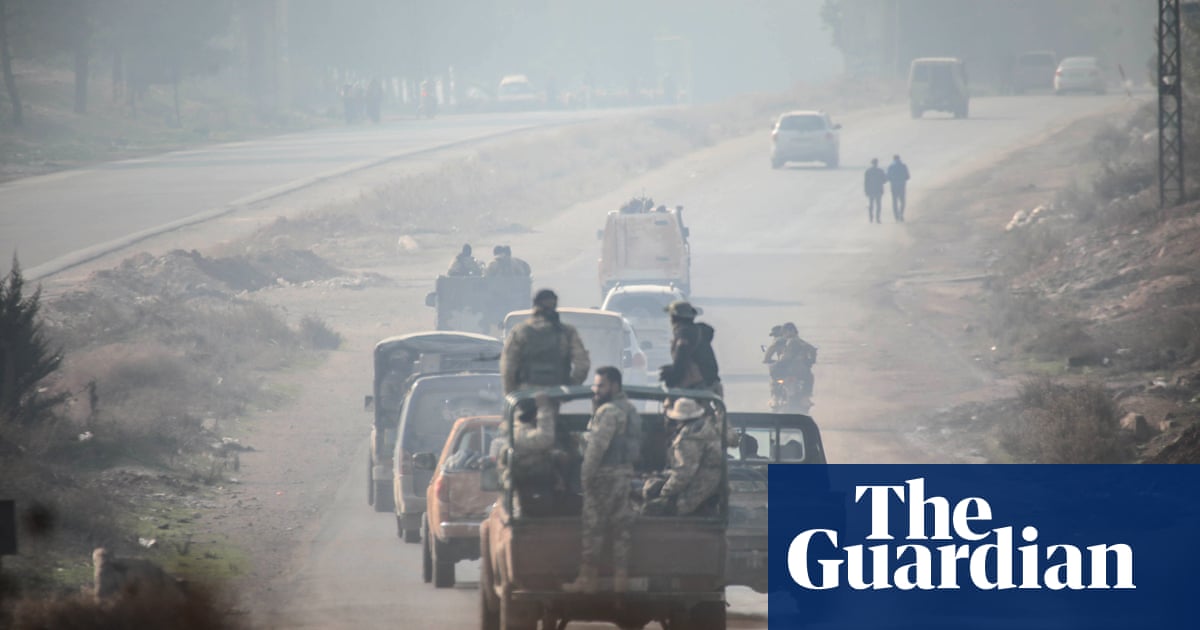Syrian insurgents have entered towns north of the country’s third largest city, Homs, sweeping along a highway that eventually leads to the capital, Damascus, in a lightning-fast advance that has shaken the Middle East.
Militants spearheaded by the group Hayat Tahrir al-Sham (HTS) took control of the city of Hama on Thursday before moving south, swiftly capturing two key towns on the road south of the city before arriving in Al-Dar al-Kabera, a town five miles from the centre of Homs.
The Russian embassy in Damascus instructed Russian nationals to leave Syria, in a rare show of alarm. Moscow has remained a key ally of Syria’s president, Bashar al-Assad, including providing military support.
Video from the opposition-aligned Aleppo Today channel showed airstrikes targeting Talbiseh on the road between Hama and Homs shortly after it was claimed by insurgents. The defence ministry in Damascus said Russian and Syrian military aircraft were responsible for airstrikes on the Hama countryside, while a strike attributed to forces from Moscow destroyed a bridge along the highway leading into Homs.
Speaking to reporters outside a mosque in Istanbul, the Turkish president, Recep Tayyip Erdoğan, offered a message of support to the insurgency. He had previously offered to “discuss shaping the future of Syria,” together with Assad, he said, “but we received no response”.
“Idlib, Hama, Homs and after that most probably Damascus … we hope this march in Syria will continue without any issues,” he said. The foreign ministers of Turkey, Iran and Russia are expected to meet tomorrow on the sidelines of a forum in Doha for an urgent meeting on Syria.
The city of Homs sits at a key juncture close to the Lebanese border, connecting the road to Damascus with a highway to the coastal communities, Assad’s heartland and a site of Russian naval bases. Homs witnessed some of the fiercest fighting during earlier phases of Syria’s civil war over a decade ago, with rebel forces engaged in years-long street battles the army and allied Syrian militia forces, as well as the Lebanese militant group Hezbollah.
Insurgents have called on the people of Homs to rise up against the regime, telling them “your time has come” in a message circulated online, as thousands fled to Damascus or into the province of Latakia.
Fighting to take Homs is expected to prove pivotal in the insurgents’ efforts to sweep south towards the capital. In little over a week their advance saw them rapidly take control of Aleppo, Syria’s second city, as well as full control of Hama after a rapid retreat by Syrian government forces. The unexpected advance marks the first time that both cities have been fully under opposition control since a popular uprising against Assad in 2011 then spilled over into a bloody civil war.
after newsletter promotion
Forces loyal to Damascus appeared to be struggling to hold off the insurgent advances, as well as the mounting threat of further rebellion in the province of Daraa, south of the capital, where local bands of rebel fighters seized a security checkpoint and armed vehicles from government forces.
In Deir ez-Zor in eastern Syria, the Turkish state news agency Anadolu reported that Syrian government forces had transferred control of the city centre to Kurdish militants, withdrawing from the city. The leader of US-backed Kurdish forces also warned that Islamic State militants had “increased movement” in the area.
In a rare late-night address, the Syrian defence minister, Ali Mahmoud Abbas, called his forces withdrawal from Hama a “temporary tactical measure,” and said his forces had “deployed to save lives”.
The battle for Homs drew signs of further intervention from Damascus’s longtime allies, particularly Tehran and its proxy forces. Two senior Lebanese security sources told Reuters that Hezbollah had dispatched a small number of “supervising forces” to prevent the insurgents from seizing Homs.
A senior Iranian official said “it is likely that Tehran will need to send military equipment, missiles and drones to Syria … Tehran has taken all necessary steps to increase number of its military advisers in Syria and deploy forces.”
The Iranian foreign minister, Abbas Araghchi, was due to hold talks with his Iraqi and Syrian counterparts in Baghdad, as Iraqi ministers feared the fighting in Syria could affect neighbouring Iraq.
The HTS leader known by his nom de guerre, Abu Mohammed al-Jolani, issued a message to the Iraqi prime minister, Mohammed Shia’ al-Sudani, pledging that the fighting in Syria “will not spill over into Iraq”, and urging al-Sudani’s government to “distance itself from the situation in Syria”.
Speaking to CNN, al-Jolani said the insurgents’ aim remainsedto topple the Assad regime in Damascus.
“When we talk about objectives, the goal of the revolution remains the overthrow of this regime. It is our right to use all available means to achieve that goal,” he said.

